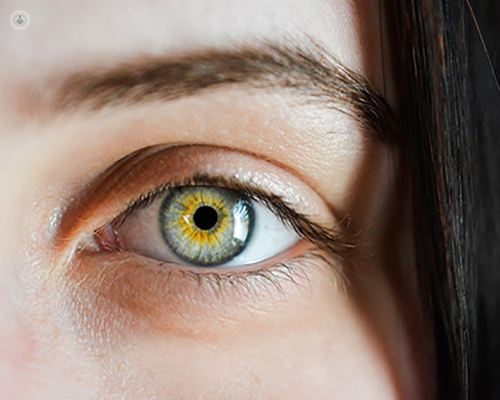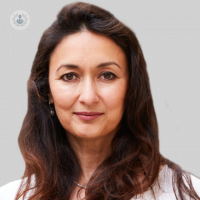Comprehensive guide to macular hole surgery and recovery
Written in association with:In her latest online article, Miss Rahila Zakir gives us her insights into macular hole surgery. She talks about the operation duration, anaesthesia, post-operative positioning, gas bubble precautions, travel restrictions and gas absorption, post-surgical care, return to work and general precautions.

Vitrectomy surgery for macular hole:
Macular hole surgery, primarily involving vitrectomy, is a minimally invasive procedure performed under a microscope using three small incisions in the eye's white area. The process begins with the removal of the vitreous jelly, followed by delicately peeling off the inner limiting membrane surrounding the hole to release tension forces that keep it open. The eye is then filled with a temporary gas bubble that assists in sealing the hole. While the gas bubble temporarily obstructs vision, it gradually dissipates over an approximate 8-week period.
Operation duration and anaesthesia:
Macular hole surgery usually lasts between 45 to 90 minutes and can be conducted under local (awake) or general anaesthesia. Local anaesthesia involves a numbing injection around the eye, often supplemented with sedation to alleviate anxiety. Patients may opt for either form of anaesthesia, with the procedure frequently being a day case operation.
Post-operative positioning and gas bubble precautions:
Post-surgery, positioning—specifically maintaining an 'eyes down' posture—aims to support the gas bubble in contact with the hole for enhanced closure. While it’s beneficial for larger holes, smaller holes might not require such positioning. Devices such as horseshoe-shaped pillows or specially cushioned frames can aid in maintaining the desired face-down posture, recommended for around 45 minutes per hour for 3-5 days post-operation. Despite the importance of posturing, successful closure of the hole is still possible without it.
Travel restrictions and gas absorption:
It's crucial to avoid flying or traveling to high altitudes while the gas bubble remains in the eye (between 4 to 8 weeks). Ignoring this warning can lead to extreme pressure increase and potential vision loss. After surgery, the shrinking gas bubble indicates its absorption, allowing freedom from travel restrictions and precautions related to anaesthesia.
Post-surgical care:
Following surgery, prescribed eye drops aid in the eye's recovery for a few weeks. Typically, patients spend a night in the hospital and are reviewed in clinic one to two weeks after the procedure. While most daily activities can be resumed, precautions against unhygienic environments and eye injury are advised. Vigilance for signs of complications, such as increasing pain, redness, or worsening vision, is necessary.
Return to work and general precautions:
Recovery usually requires 10-14 days off work due to reduced vision caused by the gas bubble. It's essential to adhere to the recommended precautions for eye care, including proper use of prescribed drops, gentle cleansing, and avoiding eye rubbing. Activities like driving should be avoided initially due to potential impaired vision, and care should be taken to manage fatigue following the surgery. Understanding the recovery process and adhering to post-operative guidelines are essential for a successful outcome. Consultation with healthcare professionals ensures a personalised plan based on individual circumstances.
Miss Rahila Zakir is a distinguished ophthalmologist and lifestyle medicine physician. You can schedule an appointment with Miss Zakir on her Top Doctors profile.



